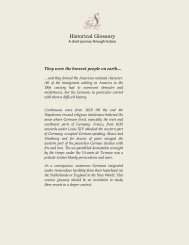- Seite 1 und 2: - .U». « >^' i^^^'is 4' ^' '•^'
- Seite 6 und 7: 30,000 löttiett €tntoanbmrn in I
- Seite 8 und 9: Entered, according to Act of Congre
- Seite 10 und 11: VI PREFACE TO THE IMPROVED EDITION.
- Seite 12 und 13: m VIII Wotttiii §ur btihtsBtxkn ^u
- Seite 14 und 15: Slögcmttne Stnlettuttg .... 35orbe
- Seite 16 und 17: — 2 GENERAL INTRODUCTION. for mil
- Seite 18 und 19: — — 4 GENERAL INTRODUCTION. The
- Seite 20 und 21: 6 GENERAL INTRODUCTION. lies, to es
- Seite 22 und 23: 8 GENERAL INTRODUCTION. uncheered b
- Seite 24 und 25: 10 GENERAL INTRODUCTION. — the Ge
- Seite 26 und 27: 12 GENERAL INTRODUCTION. In 1719, s
- Seite 28 und 29: 14 GENERAL INTRODUCTION. — This d
- Seite 32 und 33: 18 GENERAL INTRODUCTION Frantz, Sch
- Seite 34 und 35: 20 ^Ilgcmeme dinleiinng. gen beg fr
- Seite 36 und 37: 22 ^Ilgtmtint €inltitnng. lina ge
- Seite 38 und 39: 24 allgemeine ^inleUitng. nen, %^m
- Seite 40 und 41: 36 ^Ugtmetne dmltUsng. 3n Sotge bcr
- Seite 42 und 43: 28 allgemeine €ntleilo«g. gierun
- Seite 44 und 45: 30 §illg£in£tit£ ®inlthn«g. 5
- Seite 46 und 47: 32 ^Ilgtmeh« (ImkUang. tern fo arm
- Seite 48 und 49: S4 §illgtmtmt dinltitang. Scuteit,
- Seite 50 und 51: 36 ^Ugem^injE ©inUitnttg. 3rlättb
- Seite 53 und 54: PROLEGOMENA, TO WHICH THE SPECIAL A
- Seite 55: PROLEGOMENA. 41 Gknnan cmtographa a
- Seite 58 und 59: 44 J^orbtmtrknngt». ba^ fte (td^ f
- Seite 60 und 61: 46 ^oxhtmnhnnQtn. unbefttmmte Stntw
- Seite 62 und 63: 48 NAMKS OF GERMAN, SWISS to the pr
- Seite 64 und 65: 50 NAMES OF GERMAX, SWISS In vol. i
- Seite 66 und 67: 5a Bastian Muri, Jacob Gangwyer,* H
- Seite 68 und 69: 54 NAMES or GERMAN, SWISS 2tit§cr
- Seite 70 und 71: 56 KAUES OF GKRMAN, SWISS Johannes
- Seite 72 und 73: 58 NAMES OP GERMAN, SWISS Jacob Kuh
- Seite 74 und 75: 60 NAMES OF GERMAN, SWISS Jacob Rei
- Seite 76 und 77: — 62 NAMES OF GERMAN, SWISS Germa
- Seite 78 und 79: 64 NAMES OP GERMAN, SWISS Dietrich
- Seite 80 und 81:
66 NAMES OF GERMAN, SWISS Conrad Ec
- Seite 82 und 83:
— — 68 NAMES OF GERMAN, SWISS !
- Seite 84 und 85:
— 70 NAMES OP GERMAN, SWISS Mich.
- Seite 86 und 87:
72 NAMES OF GERMAN, SWISS sixteen,
- Seite 88 und 89:
74 NAMES OP GERMAN, SWISS fcc^je^n
- Seite 90 und 91:
76 NAMES OF GERJIAN, SWISS Johan Ja
- Seite 92 und 93:
— 78 NAMES OF GERMAN, SWISS Haus
- Seite 94 und 95:
80 Peter Kreiter, Johannes Kreiter,
- Seite 96 und 97:
82 NAMES OP GERMAN, SWISS G-eorg Ph
- Seite 98 und 99:
— 84 NAMES OF GERMAN, SWISS A. Si
- Seite 100 und 101:
86 NAMES OF GERMAN, SWISS Under six
- Seite 102 und 103:
— 88 NAMES OP GERMAN, SWISS Georg
- Seite 104 und 105:
— 90 NAMES OP GERMAN, SWISS last
- Seite 106 und 107:
— 92 NAMES OF GERMAN, SWISS Hans
- Seite 108 und 109:
— — — 94 NAMES OF GERMAN, SWI
- Seite 110 und 111:
96 NAMES OF GERMAN, SWISS Ilans Hen
- Seite 112 und 113:
98 NAMES OF GERMAN, SWISS helm Ahlb
- Seite 114 und 115:
— 100 NAMES OF GERMAN, SWISS Slug
- Seite 116 und 117:
102 NAMES OF GERMAN, SWISS Johannes
- Seite 118 und 119:
104 NAMES OP GERMAN, SWISS Hans Geo
- Seite 120 und 121:
106 NAMES OF GERMAN, SWISS Georg We
- Seite 122 und 123:
108 NAMES OF GERMAN, SWISS 47) Sept
- Seite 124 und 125:
no NAMES OF GERMAN, SWISS Christian
- Seite 126 und 127:
— 112 NAMES OF GERMAN, SWISS Abra
- Seite 128 und 129:
114 NAMES OF GERMAN, SWISS Hans Boa
- Seite 130 und 131:
116 NAMES OF GERMAN, SWISS 53) Sept
- Seite 132 und 133:
118 NAMES OP GERMAN, SWISS Wolfgang
- Seite 134 und 135:
120 NAMES OP GERMAN, SWISS 56) Sept
- Seite 136 und 137:
122 NAMES OP GERMAN, SWISS Jacob Be
- Seite 138 und 139:
124 NAMES OP GERMAN, SWISS 59) Sept
- Seite 140 und 141:
126 NAMES OP GERMAN, SWISS Oct 27,
- Seite 142 und 143:
128 NAMES OF GERMAN, SWISS Johann J
- Seite 144 und 145:
130 NAMES OF GERMAN, SWISS Joseph D
- Seite 146 und 147:
132 NAMES OF GERMAN, SWISS Jacob Du
- Seite 148 und 149:
134 NAMES OF GERMAN, SWISS 2tug. 27
- Seite 150 und 151:
136 NAMES OF GERMAN, SWISS 72) Sept
- Seite 152 und 153:
138 NAMES OF GERMAN, SWISS Johann C
- Seite 154 und 155:
140 NAMES OF GERMAN, SWISS 76) Sept
- Seite 156 und 157:
142 NAMES OF GERMAN, SWISS Andreas
- Seite 158 und 159:
144 NAMES OF GERMAN, SWISS 80) Dec.
- Seite 160 und 161:
146 NAMES OF GERMAN, SWISS Johannes
- Seite 162 und 163:
148 NAMES OP GERMAN, SWISS Ulrich S
- Seite 164 und 165:
150 Johan Ruddiss, Daniel Zinck,* M
- Seite 166 und 167:
152 NAMES OP GERMAN, SWISS Johann N
- Seite 168 und 169:
154 NAMES OP GERMAN, SWISS
- Seite 170 und 171:
156 NAMES OF GERMAN, SWISS Moritz Z
- Seite 172 und 173:
158 NAMES OF GERMAN, SWISS Matlieis
- Seite 174 und 175:
160 NAMES OF GERMAN, SWISS Lorentz
- Seite 176 und 177:
163 Dietricli Fohl, Johannes Zepter
- Seite 178 und 179:
164 NAMES OP GERMAN, SWISS Lorentz
- Seite 180 und 181:
166 NAMES OF GERMAN, SWISS Johannes
- Seite 182 und 183:
168 NAMES OP GERMAN, SWISS unb ungc
- Seite 184 und 185:
170 NAMES OF GERMAN, SWISS Joh. Geo
- Seite 186 und 187:
172 NAMES OF GERMAN, SWISS 107) Dec
- Seite 188 und 189:
174 NAMES OP GERMAN, SWISS (Sept. 2
- Seite 190 und 191:
176 NAMES OP GERMAN, SWISS Valentin
- Seite 192 und 193:
178 NAMES OF GERMAN, SWISS Caspar B
- Seite 194 und 195:
180 NAMES OF GERMAN, SWISS Sebastia
- Seite 196 und 197:
182 NAMES OF GERMAN, SWISS Joh. Wil
- Seite 198 und 199:
184 NAMES OP GERMAN, SWISS Joh. And
- Seite 200 und 201:
186 NAMES OP GERMAN, SWISS Johannes
- Seite 202:
188 NAMES OF GERMAN, SWISS Hans Zö
- Seite 206 und 207:
190 NAMES OF GERMAN, SWISS Matthäu
- Seite 208 und 209:
192 NAMES OF OERMAN, SWISS Jaus Jac
- Seite 211 und 212:
Hans Conrad Schauwecker, Martin Sch
- Seite 213 und 214:
AND OTHER IMMIGRANTS—1749. 195 Jo
- Seite 215 und 216:
Johannes Kraun, Johannes Miller,* F
- Seite 217 und 218:
Joh. Michael Mayer, Hans Georg Haff
- Seite 219 und 220:
Heinrich Conrad, Abraham Jung, Pete
- Seite 221 und 222:
— AND OTHER IMMIGRANTS—1749. 20
- Seite 223 und 224:
Johannes Boushy,* Jacob Miller,* Ch
- Seite 225 und 226:
Georg Fried. Zangmeister, Franz Geo
- Seite 227 und 228:
Ludwig Held,* Johannes Amstedt, Han
- Seite 229 und 230:
Wolff Caspex' Geyer, Joh. Reinhart
- Seite 231 und 232:
Kudolph Haberly,* Heinrich Greb, Ha
- Seite 233 und 234:
Georg Michel Scliuitz, Hans Rudolph
- Seite 235 und 236:
Johannes Eckman,* Henry Mohler,* Pe
- Seite 237 und 238:
•Nickolas Simon, Christian Lentz,
- Seite 239 und 240:
Heinrich Kübarts, Johannes Stieble
- Seite 241 und 242:
— Hans Georg Mayer, Georg Frieder
- Seite 243 und 244:
Carl Vollunte * Jacob Dannether, Ha
- Seite 245 und 246:
AND OTHER IMMIGRANTS 1750. 227 2lu9
- Seite 247 und 248:
Jacob Grob,* John Brenbauer,* Jacob
- Seite 249 und 250:
Henry Weys,* Eudolff Widmer * Hans
- Seite 251 und 252:
Johan Baltzer Schmith, Christian Ka
- Seite 253 und 254:
AND OTHER IMMIGRANTS—1750. 235 Se
- Seite 255 und 256:
Hans Michel Nothsteiu, John George
- Seite 257 und 258:
Johannes Vollmer, Daniel Bohset, Ma
- Seite 259 und 260:
Joh. Simon Oberdorff,''' Carl Mille
- Seite 261 und 262:
156) Sept. 17, 1750. Captain, from
- Seite 263 und 264:
Georg Weiss, Jacob G-raf, Jacob Beh
- Seite 265 und 266:
AND OTHER IMMIGRANTS—1751. 247 Ha
- Seite 267 und 268:
AND OTHER IMMIGRANTS—1751. 249 Jo
- Seite 269 und 270:
AND OTHER IMMIGRANTS—1751. 251 ^t
- Seite 271 und 272:
Michael Heyler, Simon Burchhart, Jo
- Seite 273 und 274:
AND OTHER IMMIGRANTS—1751. 255 Pe
- Seite 275 und 276:
Hans Conrad Steiger, Hans Georg Sch
- Seite 277 und 278:
Johannes Hein, Johannes Henrich, Jo
- Seite 279 und 280:
AND OTHER IMMIdlRANTS— 1751, 261
- Seite 281 und 282:
AND OTHER IMMIGRANTS—1751. 263 mi
- Seite 283 und 284:
Joh. Georg Fried. Bayer, Gabriel W
- Seite 285 und 286:
Johannes Waller,* Michael Hollstein
- Seite 287 und 288:
AND OTHER IMMIGRANTS—1751. 269 Ge
- Seite 289 und 290:
AND OTHER IMMIGRANTS—1752. 271 (B
- Seite 291 und 292:
AND OTHER IMMIGRANTS—1752. 273 Ja
- Seite 293 und 294:
Anthony Zimmermann, Hans Ulrich Beu
- Seite 295 und 296:
AND OTHER IMMIGRANTS—1752. 277 17
- Seite 297 und 298:
Michael Schwar, Jacob Butz,* Martin
- Seite 299 und 300:
Christian Dürz, Nicolaus Schunder,
- Seite 301 und 302:
Carl Fr. Biebert,? Philip Jacob Wun
- Seite 303 und 304:
Johann Jacob Friess, Hans Adam Webe
- Seite 305 und 306:
Johan Henrich Humerich, Johann Geor
- Seite 307 und 308:
AND OTHER IMMIGRANTS—1752. 289 Im
- Seite 309 und 310:
Job. Wilhelm Engesbach, Johan Adam
- Seite 311 und 312:
Johan Ludwig Feister, Johan Christi
- Seite 313 und 314:
Peter Weis, Joh. Ohnschild,* H. Mic
- Seite 315 und 316:
Hans Georg Kautz, Joh. Philip Schwa
- Seite 317 und 318:
AND OTHER IMMIGRANTS—1753. 299 19
- Seite 319 und 320:
Georg Christoph Dietz, Hans Georg K
- Seite 321 und 322:
Jacob Schott, Johannes Laffer, Pete
- Seite 323 und 324:
Hans Conrad Hogoodus, Hans Georg Br
- Seite 325 und 326:
AND OTHER IMMIGRANTS—1753. 307 Jo
- Seite 327 und 328:
Johann Michael Desch, Joh. Lenhart
- Seite 329 und 330:
Johan Andreas Sclirodlie, Johan Wil
- Seite 331 und 332:
Daniel Speck, Ciispar Lutz, Heinric
- Seite 333 und 334:
AND OTHER IMMIGRANTS—1753. 315 Jo
- Seite 335 und 336:
G. Peter Bear * (leorge Hoover,* Da
- Seite 337 und 338:
Philip Wagner, Gottfried Krum,* And
- Seite 339 und 340:
Georg Friederich Iloolböck, Johan
- Seite 341 und 342:
t»cr Sifte ftiib. AND OTHER IMMIGR
- Seite 343 und 344:
Johannes Jüngst, Jacob Geissler, J
- Seite 345 und 346:
AND OTHER IMMIGRANTS—1754. 327 J.
- Seite 347 und 348:
Henry Weidman, Jacob Bernhard, Wilh
- Seite 349 und 350:
Adam Strehm, Valtin Beltzer, Henric
- Seite 351 und 352:
Conrad Wagner, Valentin Cleinentz,
- Seite 353 und 354:
Thomas Dihm, Hans Adam Dihm, Thomas
- Seite 355 und 356:
Christian Newcomer,* Christian Helh
- Seite 357 und 358:
Adam Neubeck,? Joh. Christoph Lang,
- Seite 359 und 360:
Johan Georg Jäger, Joh. Nicolaus D
- Seite 361 und 362:
Michael Poobagh,* Johannes Hoch, Ma
- Seite 363 und 364:
— AND OTHER IMMIGRANTS—1754. 34
- Seite 365 und 366:
Johannes Weygandt, Michael Scheck,
- Seite 367 und 368:
AND OTHER IMMIGRANTS—1755, 349 Dc
- Seite 369 und 370:
AND OTHER IMMIGRANTS—1756, 1761.
- Seite 371 und 372:
AND OTHER IMMIGRANTS—17G3, 353 Jo
- Seite 373 und 374:
AND OTHER IMMIGRANTS—17G4. 355 «
- Seite 375 und 376:
Frantz Schwartz, Matthias Kempe, An
- Seite 377 und 378:
Johannes Blitz, Oswald Rap, Peter G
- Seite 379 und 380:
Jacob Vadel, Henrich Schell, Johann
- Seite 381 und 382:
AND OTHER IMMIGRANTS—1764. 363 Jo
- Seite 383 und 384:
Johann Daniel Franck, Johann Georg
- Seite 385 und 386:
Philip Golb * Carl Uhl, Nicolaus Bo
- Seite 387 und 388:
Heinrich Laiitzenheisser,* Peter La
- Seite 389 und 390:
AND OTHER IMMIGRANTS—1765. 371 Va
- Seite 391 und 392:
AND OTHER IMMIGRANTS—1766. 373 25
- Seite 393 und 394:
IMichacl Ratli, Daniel Brenner, Jos
- Seite 395 und 396:
AND OTHER IMMIGRANTS—17G7. 377 25
- Seite 397 und 398:
AND OTHER IMMIGRANTS—1767. 379 26
- Seite 399 und 400:
Johannes Kister, Johannes Keyser, C
- Seite 401 und 402:
AND OTHER IMMIGRANTS—1768. 383 Ma
- Seite 403 und 404:
Johan Valentin Krauss, Joh. Peter S
- Seite 405 und 406:
Stephani Felix, Martin Felix, Micha
- Seite 407 und 408:
AND OTHER IMMIGRANTS—17G9. 389 Jo
- Seite 409 und 410:
Greorg Mengs, Michael Schmitt, Joha
- Seite 411 und 412:
AND OTHER IMMIGRANTS—1770. 393 Ch
- Seite 413 und 414:
Johann Peter Kuntz, Johann Peter He
- Seite 415 und 416:
AND OTHER IMMIGRANTS—1771. 397 «
- Seite 417 und 418:
Henrich Dicke, Hermanus Dicke, Rudy
- Seite 419 und 420:
AND OTHER IMMIGRANTS—1772. 401 Ma
- Seite 421 und 422:
Johann Jacob Eller, Wilhelm Henrich
- Seite 423 und 424:
Edeme Halbon, Gerhard Meyer, Arnold
- Seite 425 und 426:
Johann Henrich Thielo, John Henry B
- Seite 427 und 428:
Joh. Georg Wenner, Joh. Jeremias Bo
- Seite 429 und 430:
Philip Peter Grruber, Johann Georg
- Seite 431 und 432:
John Sclilichter, Joh. Math. Weber,
- Seite 433 und 434:
Michael Lillienthal,* John George G
- Seite 435 und 436:
Christoph Herbster, Heinrich Engelf
- Seite 437 und 438:
Conrad Tresenreutlier, Johann Georg
- Seite 439 und 440:
— ADDENDA. 421 A. D. 1737.— Geo
- Seite 441 und 442:
— ADDENDA. 423 Udey, first Englis
- Seite 443 und 444:
— ^«sat§. 425 1737. ©cor 9 ^^e
- Seite 445 und 446:
nxxsut^. 427 3lnton 2Bac|ner, flarf
- Seite 447 und 448:
APPENDIX. 429 APPENDIX mm^i No. I.
- Seite 449 und 450:
— Gerhart Küttynhuysen, Matthias
- Seite 451 und 452:
— APPENDIX. 433 Isaac von Sintern
- Seite 453 und 454:
Johannes Dewalt End, Johan Georg Be
- Seite 455 und 456:
1712: Hans Georg Schutz, Martin Keu
- Seite 457 und 458:
APPENDIX. 439 Christoplier Ley, Joh
- Seite 459 und 460:
— — APPENDIX. 441 91amcn, 5tltc
- Seite 461 und 462:
APPENDIX. No. V. 443 NAMES AND AGES
- Seite 463 und 464:
APPENDIX. 445 No. VI. NAMES AND AGE
- Seite 465 und 466:
Conrad Martin, Adam Hardel, Gottfri
- Seite 467 und 468:
Jacob Löwengut, Johannes Noäcker,
- Seite 469 und 470:
APPENDIX. 451 Frantz Hernberger, Go
- Seite 471 und 472:
APPENDIX. 453 „Dbfc^on Die ^xo'ou
- Seite 473 und 474:
APPENDIX. 455 tion from taxes for t
- Seite 475 und 476:
APPENDIX. 457 number and acquired p
- Seite 477 und 478:
APPENDIX. 459 ongeflcllt, um ©elt
- Seite 479 und 480:
APPENDIX. 461 Shenandoah Valley, in
- Seite 481 und 482:
APPENDIX. 463 No. XIII. NAMES OF MA
- Seite 483 und 484:
APPENDIX. 465 No. XIV. NAMES OF EAR
- Seite 485 und 486:
Johann Schoss, Abraham Nef, Andreas
- Seite 487 und 488:
Johan Wilhelm Hoster, Abraham Lebbo
- Seite 489 und 490:
APPENDIX. 471 Amity Toion&hip. Joha
- Seite 491 und 492:
Bernhard Rieser, 80, Isaac Van Sent
- Seite 493 und 494:
Jacob Hottenstein, Peter Andreas, J
- Seite 495 und 496:
Christian Kroll, 50, Isaac Klein, 1
- Seite 497 und 498:
INTERPRETATION OF NAMES. 479 Interp
- Seite 499 und 500:
— INTERPRETATION OF NAMES. 481 AU
- Seite 501 und 502:
INTERPRETATION OP NAMES. 483 DAVID,
- Seite 503 und 504:
INTERPRETATION OP NAMES. 486 FILBER
- Seite 505 und 506:
INTERPRETATION OF NAMES. 487 man, m
- Seite 507 und 508:
KARL, Carle, Charles ; INTERPRETATI
- Seite 509 und 510:
INTERPRETATION OP NAMES. 491 MAXIMI
- Seite 511 und 512:
INTERPRETATION OF NAMES. 493 RICHAR
- Seite 513:
INTERPRETATION OP NAMES. 495 ULRICH








